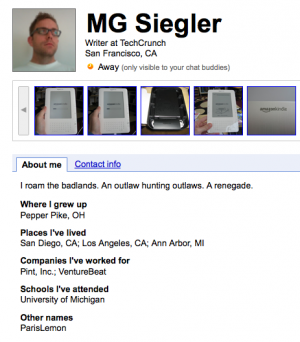 Facebook, MySpace, LinkedIn, Yahoo and now Google. What do these have in common? If you’re reading this blog, you probably have a profile on all of them. And those are just the obvious ones, you probably have a bunch of other profiles on a series of other networks too. The situation has become untenable.
Facebook, MySpace, LinkedIn, Yahoo and now Google. What do these have in common? If you’re reading this blog, you probably have a profile on all of them. And those are just the obvious ones, you probably have a bunch of other profiles on a series of other networks too. The situation has become untenable.
Imagine if you wanted to update one piece of information on all of them — like I recently had to do with a job change. That’s a lot of work for such a minor tweak. But if you don’t do it across the board, there will be incorrect information about you out there on the web. Information that is always just a search away.
Sure, there are calls for profile standards, and even some services that promise to update your information across multiple networks in one fell swoop — but let’s be honest, the only way you’re ever going to get a unified profile, is if one of the aforementioned services gets so big that it becomes the de-facto standard. Facebook is getting closer to that than anyone else with over 250 million users and rising, but Google may have well as have taken a crowbar to its knees today.
By adding its own profiles to search results on Google for names, Google has created yet another profile that we need to maintain. While that’s good for Google — Google Profiles have been around for a while, but no one used them — it’s more work for us, and seems to all but ensure that one network will not rule them all.
And we can all say that we’re going to drop all networks besides the one we use the most, but we won’t. For most people, the social graph is different on each of them, and there’s some reason to stick around there. If nothing else, it’s more of a pain to remove yourself from a service than it is just not to update your profile anymore. I can’t even begin to imagine how many profiles I have out there that haven’t been updated in a year or more.
 And even if we did drop all our networks but one, another hot new network would rise up and we’d all sign up for it, renewing the cycle. Just look at Twitter. Everyone is now signing up for it, and while it doesn’t have a robust profile right now, it probably will at some point.
And even if we did drop all our networks but one, another hot new network would rise up and we’d all sign up for it, renewing the cycle. Just look at Twitter. Everyone is now signing up for it, and while it doesn’t have a robust profile right now, it probably will at some point.
And services like Facebook Connect offer the promise of transferring your profile information to other services, but do you think Google is going to use that? I don’t think so. Why would it? It has a competing product it’s trying to push with Google Friend Connect. And it can act as nice at it wants, say the right things in public, and add links to Facebook under your Google Profile result, but do you really think Google wants Facebook winding up as the one profile you maintain? No. And vice versa.
And so we remain at a stand still. It’s one of those situations where, while competition may not be a bad thing, it can be a frustrating thing. I wonder how long until we see Yahoo add profiles to its search results? And maybe Microsoft will further its relationship with Facebook to add limited profile information from there to its queries. It’s already a mess, and it’s going to get worse before it gets better — if it ever does.
Update: As Google’s Kevin Marks notes in the comments, Google did try to use Facebook data with Friend Connect, before it was blocked almost a year ago. Of course, Friend Connect would basically negate the need for a lot of what Facebook Connect does, so what we have here are competing platforms, and a stand-off — like I said above.
[photo: flickr/andrew mason]